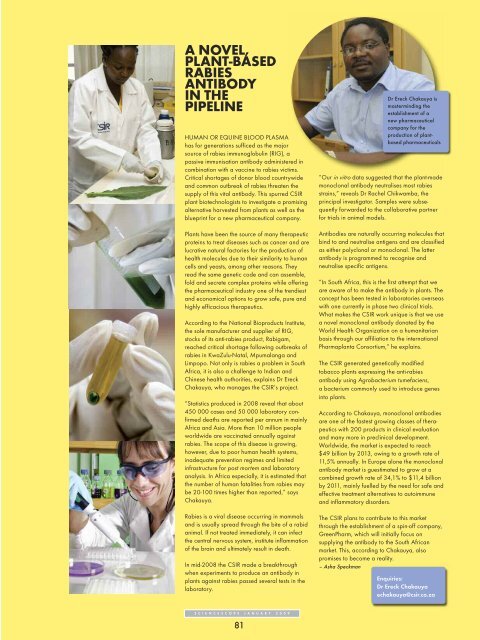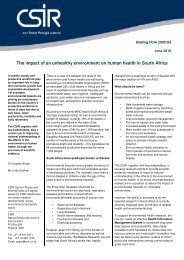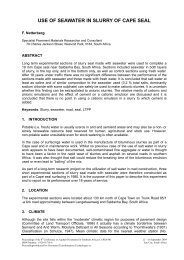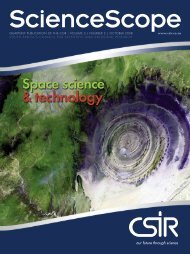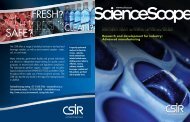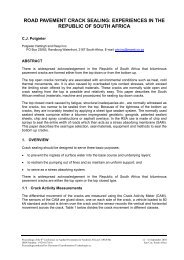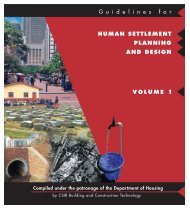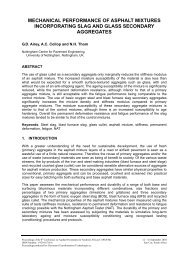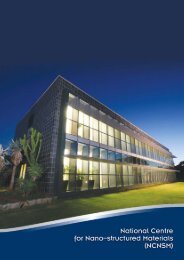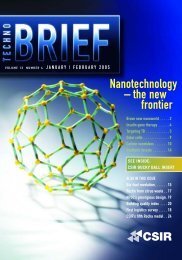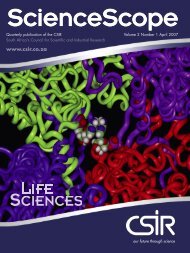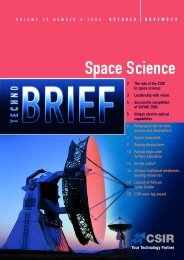Chapter 3 - CSIR
Chapter 3 - CSIR
Chapter 3 - CSIR
You also want an ePaper? Increase the reach of your titles
YUMPU automatically turns print PDFs into web optimized ePapers that Google loves.
A NOVEL,PLANT-BASEDRABIESANTIBODYIN THEPIPELINEHUMAN OR EQUINE BLOOD PLASMAhas for generations sufficed as the majorsource of rabies immunoglobulin (RIG), apassive immunisation antibody administered incombination with a vaccine to rabies victims.Critical shortages of donor blood countrywideand common outbreak of rabies threaten thesupply of this vital antibody. This spurred <strong>CSIR</strong>plant biotechnologists to investigate a promisingalternative harvested from plants as well as theblueprint for a new pharmaceutical company.Plants have been the source of many therapeuticproteins to treat diseases such as cancer and arelucrative natural factories for the production ofhealth molecules due to their similarity to humancells and yeasts, among other reasons. Theyread the same genetic code and can assemble,fold and secrete complex proteins while offeringthe pharmaceutical industry one of the trendiestand economical options to grow safe, pure andhighly efficacious therapeutics.According to the National Bioproducts Institute,the sole manufacturer and supplier of RIG,stocks of its anti-rabies product, Rabigam,reached critical shortage following outbreaks ofrabies in KwaZulu-Natal, Mpumalanga andLimpopo. Not only is rabies a problem in SouthAfrica, it is also a challenge to Indian andChinese health authorities, explains Dr EreckChakauya, who manages the <strong>CSIR</strong>’s project.“Statistics produced in 2008 reveal that about450 000 cases and 50 000 laboratory confirmeddeaths are reported per annum in mainlyAfrica and Asia. More than 10 million peopleworldwide are vaccinated annually againstrabies. The scope of this disease is growing,however, due to poor human health systems,inadequate prevention regimes and limitedinfrastructure for post mortem and laboratoryanalysis. In Africa especially, it is estimated thatthe number of human fatalities from rabies maybe 20-100 times higher than reported,” saysChakauya.Rabies is a viral disease occurring in mammalsand is usually spread through the bite of a rabidanimal. If not treated immediately, it can infectthe central nervous system, institute inflammationof the brain and ultimately result in death.In mid-2008 the <strong>CSIR</strong> made a breakthroughwhen experiments to produce an antibody inplants against rabies passed several tests in thelaboratory.Dr Ereck Chakauya ismasterminding theestablishment of anew pharmaceuticalcompany for theproduction of plantbasedpharmaceuticals“Our in vitro data suggested that the plant-mademonoclonal antibody neutralises most rabiesstrains,” reveals Dr Rachel Chikwamba, theprincipal investigator. Samples were subsequentlyforwarded to the collaborative partnerfor trials in animal models.Antibodies are naturally occurring molecules thatbind to and neutralise antigens and are classifiedas either polyclonal or monoclonal. The latterantibody is programmed to recognise andneutralise specific antigens.“In South Africa, this is the first attempt that weare aware of to make the antibody in plants. Theconcept has been tested in laboratories overseaswith one currently in phase two clinical trials.What makes the <strong>CSIR</strong> work unique is that we usea novel monoclonal antibody donated by theWorld Health Organization on a humanitarianbasis through our affiliation to the internationalPharmaplanta Consortium,” he explains.The <strong>CSIR</strong> generated genetically modifiedtobacco plants expressing the anti-rabiesantibody using Agrobacterium tumefaciens,a bacterium commonly used to introduce genesinto plants.According to Chakauya, monoclonal antibodiesare one of the fastest growing classes of therapeuticswith 200 products in clinical evaluationand many more in preclinical development.Worldwide, the market is expected to reach$49 billion by 2013, owing to a growth rate of11,5% annually. In Europe alone the monoclonalantibody market is guestimated to grow at acombined growth rate of 34,1% to $11,4 billionby 2011, mainly fuelled by the need for safe andeffective treatment alternatives to autoimmuneand inflammatory disorders.The <strong>CSIR</strong> plans to contribute to this marketthrough the establishment of a spin-off company,GreenPharm, which will initially focus onsupplying the antibody to the South Africanmarket. This, according to Chakauya, alsopromises to become a reality.– Asha SpeckmanEnquiries:Dr Ereck Chakauyaechakauya@csir.co.zaS C I E N C E S C O P E J A N U A R Y 2 0 0 981


